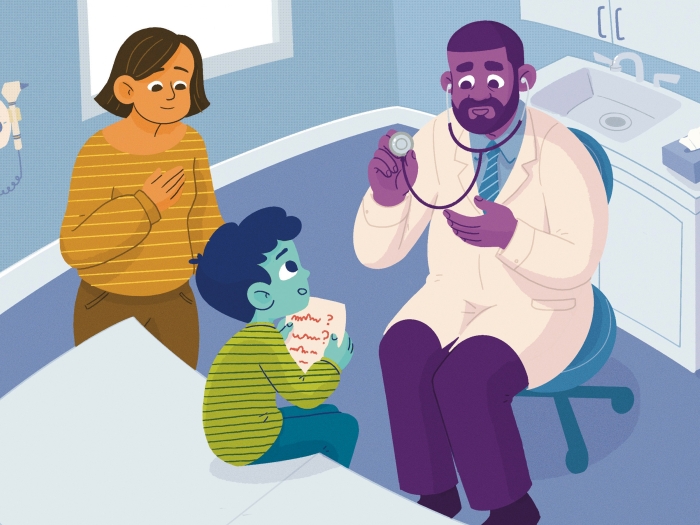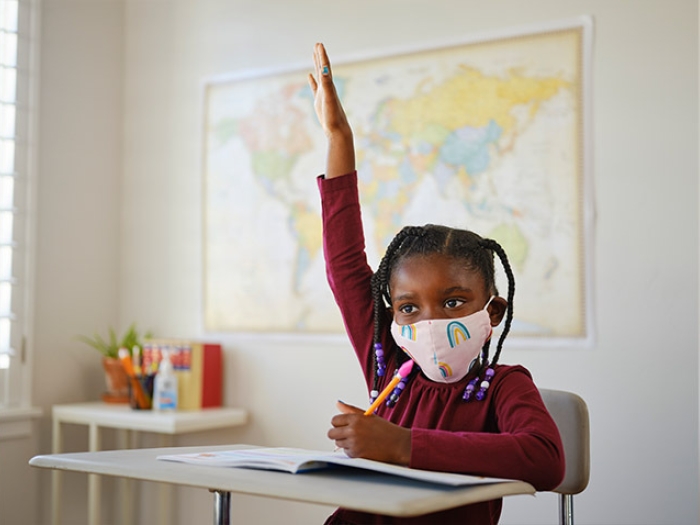Learn more about acute flaccid myelitis, a perplexing and very rare illness that causes paralysis in children.
3:00 PM
Author |

A rare neurologic illness known as acute flaccid myelitis (AFM) has been on the rise, leaving doctors and parents searching for answers.
LISTEN UP: Add the new Michigan Medicine News Break to your Alexa-enabled device, or subscribe to our daily audio updates on iTunes, Google Play and Stitcher.
Although AFM isn't new, cases spiked during the fall months of 2014 and 2016, respectively.
So far this year in the United States, 72 diagnoses have been confirmed by the Centers for Disease Control and Prevention. That's more than twice the number of diagnosed cases in all of 2017.
No preventive AFM vaccine or cure is currently available.
Even scarier: There's no way to detect that a person has AFM until the disease has progressed to muscle weakness. Resulting acute flaccid paralysis may require physical therapy; some patients may never regain their former function.
Stories of once-healthy children now facing a potential lifetime of limited mobility are more than enough to concern any parent.
But the likelihood of developing AFM is exceedingly rare, says Janet Gilsdorf, M.D., a pediatric infectious disease specialist and professor emerita with University of Michigan's C.S. Mott Children's Hospital and School of Public Health.
Fewer than 1 in 1 million people contract AFM annually, according to the CDC.
"It can be frightening," Gilsdorf says, "but we want to avoid unnecessary alarm."
Signs and symptoms of AFM
Patients with the illness typically show the hallmark (and nonspecific) signs of common illnesses before weakness appears.
MORE FROM MICHIGAN: Sign up for our weekly newsletter
"In the recent outbreaks, most children present with some sort of a cold, cough or runny nose and fever for several days," Gilsdorf says. "About a week or two later, they begin to have weakness in one or more of their limbs, such as an arm or leg."
Beyond affected limbs, the CDC has identified other symptoms of AFM. These include:
-
Facial droop or weakness
-
Difficulty moving the eyes
-
Drooping eyelids
-
Difficulty swallowing
-
Slurred speech
Parents should seek immediate medical attention if any of these symptoms occur.
But they shouldn't rush to panic.
Other conditions can cause muscle or limb weakness, Gilsdorf says, noting that if parents observe limb weakness or facial symptoms in a child they should allow doctors to conduct a thorough medical assessment.
AFM illness transmission and prevention
The CDC is still working to identify what's causing the recent outbreak of AFM.
Even though it mirrors polio, no patients with AFM have tested positive for polio. Some patients diagnosed with AFM also were found to have enterovirus D68 or EV71, cousins of poliovirus that typically circulate during the summer and fall in the U.S.
SEE ALSO: 3 Times You Risk Catching the Flu
Still, "the D68 virus implicated in some of these cases appears new," says Gilsdorf, noting that it didn't appear to cause weakness in cases reported prior to 2014.
"Many children may be infected with these viruses and not get sick at all," Gilsdorf says. "Others may have mild symptoms like a cold or fever and it goes away without incident."
The average age of patients who contract AFM is 4 years old; 90 percent of cases occur in people 18 and younger.
Because CDC researchers don't know exactly how AFM is transmitted, the organization recommends that people of all ages follow proper hand-washing guidelines.

Explore a variety of healthcare news & stories by visiting the Health Lab home page for more articles.

Department of Communication at Michigan Medicine
Want top health & research news weekly? Sign up for Health Lab’s newsletters today!





